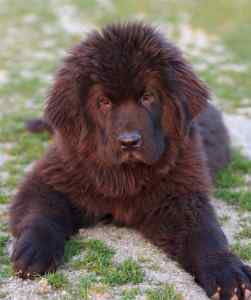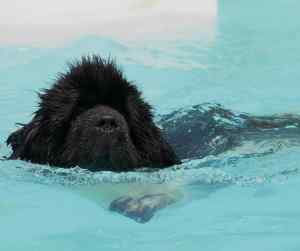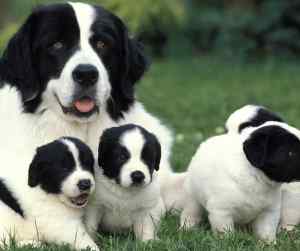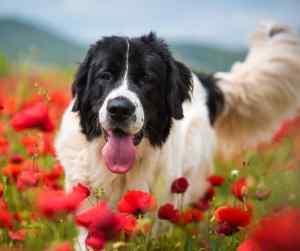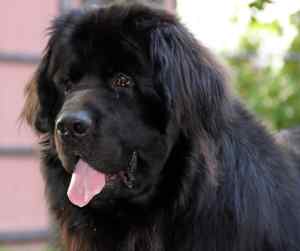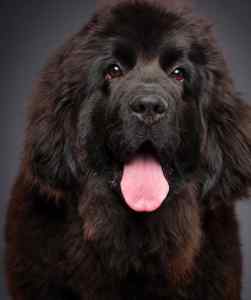Introduction
The Newfoundland dog, affectionately known as the “Newfie,” is a true gentle giant, renowned for its outstanding, sweet temperament and strong capabilities in water rescue. Originating from the Canadian province of Newfoundland, these dogs are as much a family companion as they are a working dog. This breed profile provides an in-depth look at the majestic Newfoundland dog, perfect for pet lovers considering this breed or those simply interested in learning more.
Breed Facts
- Country of Origin: Canada (Province of Newfoundland)
- Breed Group: Working
- Height: Males 28-30 inches (71-76 cm), Females 26-28 inches (66-71 cm)
- Weight: Males 130-150 lbs (59-68 kg), Females 100-120 lbs (45-54 kg)
- Lifespan: 8-10 years
- Average Price: Typically between $1,200 and $3,000
- Hypoallergenic: No
- Non-Shedding: No, they are heavy shedders
- Good with Kids: Yes, exceptionally good
- Breed Characteristics: Gentle, protective, and patient
Newfoundland Dog History
Newfoundland dogs, often affectionately referred to as “Newfies,” possess a rich and fascinating heritage that originates from the rugged, eponymous island of Newfoundland, located off the eastern coast of Canada. These majestic dogs were originally cultivated by the hardy fishermen who inhabited the island, where they served as indispensable working partners. The Newfie’s primary roles included the arduous tasks of pulling in heavy fishing nets from the frigid waters of the North Atlantic and transporting the day’s catch to local markets, often by hauling carts loaded with fish.
The precise genetic lineage of the Newfoundland breed remains somewhat shrouded in mystery. However, it is widely postulated that their ancestry is a tapestry woven from various European dog breeds. These ancestral breeds were likely introduced to Newfoundland by the myriad of European explorers, settlers, and fishermen who journeyed to the island over the centuries. Each of these breeds contributed to the development of the Newfoundland dog, endowing them with their distinct physical characteristics and temperament.
The Newfoundland breed is renowned for its exceptional swimming prowess, a trait that is not only impressive but has also proven to be life-saving. Their webbed paws, muscular build, and water-resistant double coat equip them for the challenging aquatic conditions they were bred to endure. As a result, Newfoundlands have a storied reputation for their role in numerous water rescues. These feats of bravery and skill have earned the breed accolades and admiration from around the world. Their calm disposition, combined with their strength and natural rescue instincts, makes them uniquely suited for water rescue work.
Throughout history, the Newfoundland dog has been celebrated for its contributions to human life, both in day-to-day labor alongside fishermen and in dramatic rescue operations. Their legacy is not only a testament to their enduring bond with humans but also to their versatility and adaptability as a breed.
Today, Newfoundlands continue to be cherished as loyal companions, gentle giants, and extraordinary swimmers, embodying the spirit of the rugged island that gave them their name.
Personality
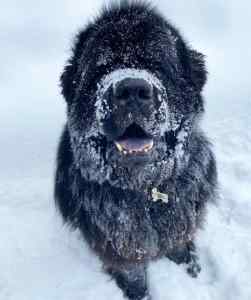 The Newfoundland dog breed is highly valued for its distinct and endearing personality traits. These dogs exude a calm and amiable temperament, which has earned them the affectionate moniker of “gentle giants” in the canine world. Their inherent gentleness and approachability are hallmark characteristics that contribute to their popularity among families and dog enthusiasts alike.
The Newfoundland dog breed is highly valued for its distinct and endearing personality traits. These dogs exude a calm and amiable temperament, which has earned them the affectionate moniker of “gentle giants” in the canine world. Their inherent gentleness and approachability are hallmark characteristics that contribute to their popularity among families and dog enthusiasts alike.
One of the most admirable qualities of Newfoundland dogs is their extraordinary patience. This trait is particularly beneficial for households with children, as these dogs display a remarkable level of tolerance and composure around young, energetic family members. Their calm demeanor makes them ideal playmates for kids, providing a safe and nurturing environment for the little ones to interact with a pet.
Despite their imposing physical stature, Newfoundland dogs are known for their soft and cautious approach when engaging with people, especially within their own family. They combine their strength with a surprising level of delicacy, ensuring that their interactions are safe and controlled. This gentle nature is not just limited to their human family members; it extends to their behavior around other pets as well.
In addition to their friendly disposition, Newfoundland dogs have a strong instinct to protect those they care about. They are naturally vigilant and can be counted on to watch over their family members with a sense of duty and loyalty. This protective streak, however, is balanced with their friendly nature, ensuring that they do not become overly aggressive.
To maintain their affable personality and ensure they develop into sociable and well-adjusted pets, early socialization is essential. Introducing a Newfoundland dog to a variety of people, animals, environments, and experiences during their formative weeks and months helps to nurture their inherent friendliness and prevents the development of shyness or fearfulness. Proper socialization teaches them to interact positively with other dogs, pets, and humans, which is vital for their emotional well-being and the safety of others.
Overall, the Newfoundland’s personality is a harmonious blend of kindness, patience, and loyalty, making them cherished companions. Their ability to bond deeply with their families, coupled with their impressive yet gentle presence, solidifies their status as beloved members of the household and the wider community.
Appearance
The Newfoundland dog boasts a striking appearance with a large, muscular build. They have a broad head with drooping ears and deep, dark eyes that reflect a kind and benevolent nature. Their coat, which can be black, brown, gray, or black and white, is dense and water-resistant, suited for their original jobs in cold, North Atlantic waters. Their webbed feet are an adaptation for swimming, making them exceptional swimmers.
Newfoundland Dog Health Concerns
Newfoundland dogs, known for their large size and gentle demeanor, share a common vulnerability with other large dog breeds when it comes to specific health problems. These issues can impact the quality of life for these gentle giants and may require medical attention and management throughout their lives.
One of the primary health concerns for Newfoundland dogs is hip and elbow dysplasia. This is an inherited condition where the hip or elbow joints develop improperly. In a healthy joint, the bones fit snugly into their corresponding sockets, allowing for smooth movement. However, in a dysplastic joint, the bones do not fit together as they should, which can cause an irregular range of motion, pain, and eventually, arthritis. This can severely affect the dog’s mobility and may lead to chronic discomfort or require surgical intervention.
Another significant health issue that can affect Newfoundland dogs is heart disease, with subvalvular aortic stenosis (SAS) being particularly common within the breed. This condition involves a narrowing of the outflow tract of the left ventricle, which can obstruct blood flow from the heart to the rest of the body.
Symptoms of SAS may include fainting, difficulty breathing, and exercise intolerance. In severe cases, this heart condition can lead to a shortened lifespan.
Cystinuria is a metabolic disorder that can also be quite concerning in Newfoundland dogs. It results in the formation of cystine stones in the kidneys or bladder due to an abnormal transport of certain amino acids in the kidneys. These stones can cause urinary blockages, urinary tract infections, and discomfort. Managing cystinuria often involves dietary changes, increased water intake, and in some cases, medications or surgery to remove the stones.
Given these potential health problems, it is crucial for those looking to bring a Newfoundland into their home to do so through a reputable breeder. Responsible breeders will conduct comprehensive genetic testing on their breeding stock to identify and reduce the likelihood of passing on such conditions to the puppies. By obtaining a Newfoundland from a breeder who prioritizes health and genetic screening, prospective owners can reduce the risk of their pet developing these inherited health issues.
Additionally, it is important for Newfoundland dog owners to maintain regular veterinary check-ups and to be vigilant for signs of these health problems so that any issues can be addressed early on.
Exercise Needs
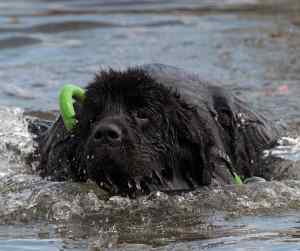 Despite their size, Newfoundlands do not require excessive exercise. They need regular, moderate exercise to keep fit, manage their weight, and stay healthy. Daily walks and some play sessions are usually sufficient. Newfies particularly enjoy swimming, which is an excellent form of exercise for them, given their prowess in water and the low impact on their joints.
Despite their size, Newfoundlands do not require excessive exercise. They need regular, moderate exercise to keep fit, manage their weight, and stay healthy. Daily walks and some play sessions are usually sufficient. Newfies particularly enjoy swimming, which is an excellent form of exercise for them, given their prowess in water and the low impact on their joints.
Training and Behavior
Training a Newfoundland should begin early, considering their massive size when fully grown. They respond well to positive reinforcement techniques such as praises, treats, and rewards. Due to their intelligent and eager-to-please nature, they are generally easy to train but require consistent leadership to ensure they understand who is in command.
Grooming Needs
The grooming needs of the Newfoundland are quite demanding. Their thick, double coat requires regular brushing several times a week to prevent matting and manage shedding. They should be bathed every one to two months, more often if they get dirty, as their coat can trap dirt and odors. Regular ear checks and teeth cleaning are also important to prevent infections and maintain overall health.
Care Needs
Owning a Newfoundland dog entails more than just routine grooming and physical care; it involves a commitment to meeting their emotional and social needs as well. Newfoundlands are known for their deep bond with humans and their need for companionship. When left in solitude for extended periods, they can become lonely and distressed, which may result in behavioral problems. It is crucial for their well-being that they have regular interaction with their human family members.
Newfoundlands are large-breed dogs and, as such, they require an environment that can accommodate their size comfortably. A small, cramped space is not suitable for these gentle giants. They need a home with ample room to move around and a secure area where they can stretch out and relax. Additionally, because of their thick coat and susceptibility to heat, it’s important to provide a cool resting area during warmer months to prevent overheating and heat-related health issues.
Diet is another critical aspect of caring for a Newfoundland. These dogs can have a propensity to gain weight if their food intake is not properly managed. It’s essential to provide a balanced diet that meets their nutritional needs without leading to overfeeding. Proper Newfoundland dog nutrition is particularly important because obesity can exacerbate potential health problems such as joint issues, which Newfoundlands are predisposed to due to their large size.
Regular veterinary check-ups, along with a carefully measured diet and appropriate exercise, will help ensure that your Newfoundland maintains a healthy weight and overall well-being.
5 Frequently Asked Questions
- How much does a Newfoundland eat daily?
- A Newfoundland dog, which is a large breed known for its strength, loyalty, and gentle disposition, typically requires a substantial amount of food to maintain its health and energy levels. An adult Newfoundland may consume approximately 4 to 5 cups of premium dry dog food each day.This quantity is based on the caloric needs of the breed, which can vary depending on the dog’s size, age, activity level, and metabolism.To ensure proper digestion and to prevent bloat—a condition that large breeds like the Newfoundland are prone to—it is recommended to divide the dog’s daily food intake into two separate meals. By splitting the food into two portions, the Newfoundland is less likely to eat too quickly or to overeat, both of which can contribute to digestive issues.When selecting the type of dry dog food, it is important to choose a high-quality product that provides balanced nutrition tailored to the unique needs of large breeds. High-quality dog food typically contains a proper ratio of protein, fats, carbohydrates, vitamins, and minerals to support the dog’s overall health, including joint health which is particularly important for large breeds that may be susceptible to hip and elbow dysplasia.It is also advisable to monitor the Newfoundland’s weight and body condition regularly, adjusting the food portions as necessary to avoid obesity, which can exacerbate health problems in large dogs. Consulting with a veterinarian can help determine the optimal feeding amount and schedule, as well as provide guidance on the best type of food for an individual dog’s needs. Regular check-ups and discussions about diet with a veterinarian ensure that a Newfoundland maintains a healthy weight and receives the nutrition it requires to thrive.
- Are Newfoundlands good for first-time dog owners?
- Yes, due to their gentle nature and trainability, Newfoundlands can be a good choice for first-time owners who are prepared to handle a large dog.
- How do Newfoundlands behave around strangers?
- They are generally friendly but can be reserved. Early socialization is key to ensure they are comfortable around new people.
- Can Newfoundlands live in hot climates?
- They can adapt to various climates, but they prefer cooler conditions. In hot climates, they should have access to plenty of water and shade.
- Are Newfoundlands good with other pets?
- Yes, when properly socialized, Newfoundlands can get along well with other dogs and pets.
Is This the Right Breed for You?
If you are looking for a loving and protective companion who thrives on being part of a family, a Newfoundland might be the perfect fit. However, potential owners must consider their ability to manage a very large dog and meet their exercise and grooming needs. Their gentle disposition makes them ideal for families with children, but their size and strength require careful management and training.
Further Reading
- The Newfoundland Club of America: Visit Website
- A comprehensive resource for everything about Newfoundland dogs, from breed information to breeder referrals.
- Your Purebred Puppy: Newfoundland Overview
- Offers detailed reviews of the Newfoundland’s temperament, health, behavior, and more.
- The American Kennel Club (AKC): Newfoundland Breed Standard
- Provides official breed standards and extensive information on their care, training, and history.
Thank you for your interest in our Newfoundland Dog breed profile. Be sure to check out the many additional breed profiles listed on our Giant Dog Breeds A to Z page.

